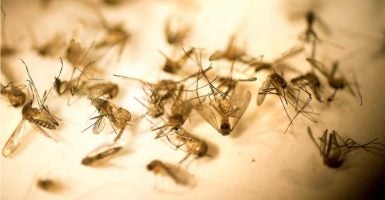The shifting of $81 million to combat Zika is overdue and demonstrates the Obama administration has had untapped resources to fight the mosquito-borne illness, House Appropriations Committee Chairman Hal Rogers, R-Ky., said.
“For over six months we have been calling on the administration to use every existing resource at their disposal to address this crisis,” Rogers said in a statement.
While the Republican House passed a Zika funding measure, Republican lawmakers have insisted that the administration has unused cash on hand to tackle the problem. However, administration officials contend this is robbing from important research in other areas, such as cancer research.
“Our calls have been met with little action, while the White House continues to cast aspersions and blame at others for lack of funding,” Rogers continued. “It is clear yet again, with the announcement today, that federal agencies do indeed have existing funds available within their budgets that can be redirected to fight Zika. This has been the case all along, and it is disappointing that it has taken this long for this action to occur.”
Secretary of Health and Human Services Sylvia Burwell announced Thursday that she is transferring $34 million from the National Institutes of Health to fund the Zika vaccine, and another $47 million from the Biomedical Advanced Research and Development Authority to continue contracting with private companies to assist in research for the vaccine.
President Barack Obama and administration officials have asked for immediate funding increases for Zika. However, Republicans in Congress have approved about $800 million less than Obama asked for, and has called on the administration to use existing resources.
Rogers actually saluted the move as needed while Senate Democrats hold up the $1.1 billion funding bill approved by the House.
“I commend the administration for finally moving forward with additional existing funding to fight this epidemic,” Rogers continued. “And, if more resources are needed, I urge the Senate Democrats and the White House to approve the legislation already passed by the House, so that these funds to prevent and stop the spread of the Zika virus can be used quickly, effectively, and responsibly.”
Obama has criticized congressional Republicans for not approving his $1.9 billion request for Zika from February. The House passed a $1.1 billion package, but Senate Democrats are holding up the legislation, complaining the bill doesn’t offer enough money and does away with environmental protections in seeking to reduce the mosquito population.
“Federal agencies do indeed have existing funds available within their budgets that can be redirected to fight Zika.” @RepHalRogers says.
In her letter to members of Congress, Burwell complained that National Institutes of Health money is being taken away from other worthy causes in order to fund the fight against Zika.
“As you know, there has been bipartisan support for providing additional support to NIH as it is on the front lines of finding effective treatments and cures for many of our nation’s most devastating illnesses, including cancer, heart disease, stroke, diabetes, Alzheimer’s disease and others,” Burwell said. “Reallocating NIH resources is not consistent with a strategy to provided maximum support to the important work that our nation’s leading scientists are performing, but the lack of a clean, bipartisan Zika funding bill has left me no choice but to move forward with the action at this time.”
There are 7,300 cases of Zika in the United States, 972 of those are pregnant women and 15 babies have been born with Zika-related illnesses or defects, according to HHS. Zika is spread by mosquitoes, but it can also be sexually transmitted and passed from pregnant mother to child. The virus is particularly dangerous for pregnant women because it can trigger microcephaly, which is a birth defect that causes a baby’s head to be smaller than expected and its brain to be underdeveloped.
Burwell said in the letter to Congress that the NIH will still need another $196 million for fiscal year 2017 to continue the Phase II trial of the Zika vaccine. The Biomedical Advanced Research and Development Authority will need another $342 million to continue working with private contractors.
“For NIH, this could involve delaying or possibly halting research work on vaccines,” Burwell said in the letter. “And for BARDA, this could result in companies that have partnered with the U.S. government to develop a Zika vaccine not having access to additional funding needed to continue their work.”
This is the second shift of money. The Obama administration announced in April it was tapping $589 million in unspent Zika funds to help fight the virus. However, members of Congress raised questions after reports that only $180 million had been obligated as of July. After that, the HHS began highlighting expenditures, such as $5.1 million on Zika testing, and $16 million on a Zika birth defect registry.
House Minority Leader Nancy Pelosi, D-Calif., blamed Republicans for blocking the funding.
“As Secretary Burwell’s letter details, Republicans’ incomprehensible inaction on Zika is forcing HHS to raid critical health initiatives just to stave off a needless and dangerous delay of Zika vaccine development,” Pelosi said in a statement. “Not only are these resources coming out of commitments to the fight against other devastating illnesses, they are nowhere near sufficient to address the Zika crisis with the seriousness it requires.”
Congress will be considering a spending bill in September that includes Zika, said Paul Winfree, director of economic policy studies at The Heritage Foundation.
“It’s clear that the administration has not been forthcoming with their ability to prioritize unobligated resources,” Winfree told The Daily Signal in an email.
Winfree said the September bill will likely require an emergency designation for the Zika funding.
“Emergency designations are not intended to avoid having to pay for spending,” Winfree added. “They are intended to provide supplemental funds outside the normal appropriations process.”






























